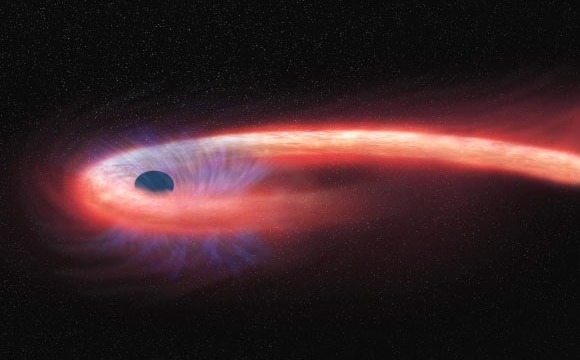About Tidal Disruption Event (TDE)
- TDE is a phenomenon in astronomy that occurs when a star passes too close to a supermassive black hole or a massive stellar-mass black hole.
- The intense gravitational forces from the black hole cause tidal forces that can tear the star apart. This process is also known as “tidal disruption.”
- How does a TDE typically unfold?
- Close Approach: A star in a galaxy approaches a black hole on a very close trajectory due to gravitational interactions within the galaxy.
- Tidal Forces: As the star gets closer to the black hole, the gravitational forces acting on it become increasingly uneven due to the difference in gravitational pull on the near side and far side of the star. These tidal forces can be strong enough to disrupt the star.
- Stellar Disruption: When the tidal forces exceed the self-gravitational forces holding the star together, it undergoes a process called “tidal disruption.” The star is stretched and eventually torn apart into a stream of gas and debris.
- Accretion Disk Formation: The debris from the disrupted star forms an accretion disk around the black hole. This disk is composed of hot gas and dust, and it spirals inwards towards the black hole.
- Energy Release: As the material in the accretion disk spirals inwards, it releases a tremendous amount of energy in the form of X-rays and ultraviolet radiation.
- Flares and Observations: TDEs are often observed as bright flares of radiation from the center of a galaxy. These flares can last for several months to years, gradually fading as the disrupted star’s material is consumed by the black hole.
What is a Blackhole?
- A black hole is a place in space where gravity pulls so much that even light cannot get out. The gravity is so strong because matter has been squeezed into a tiny space.
- This can happen when a star is dying.
- Because no light can get out, people can’t see black holes. They are invisible. Space telescopes with special tools can help find black holes.
- Event Horizon: The event horizon is the boundary around a black hole beyond which nothing can escape, not even light. It marks the point of no return. Anything that crosses this boundary is inevitably drawn into the black hole.
- Supermassive Black Holes: These are found at the centers of most galaxies and have masses ranging from millions to billions of times that of our Sun.
Q1) What is ultraviolet radiation (UV)?
Ultraviolet (UV) radiation is a type of electromagnetic radiation with wavelengths shorter than those of visible light but longer than X-rays. It falls within the electromagnetic spectrum between X-rays and visible light. UV radiation is produced by the sun, as well as by certain artificial sources such as UV lamps and lasers.
Source: Supermassive black hole gives astronomers a glimpse of star’s innards after a messy feast
Last updated on June, 2025
→ UPSC Notification 2025 was released on 22nd January 2025.
→ UPSC Prelims Result 2025 is out now for the CSE held on 25 May 2025.
→ UPSC Prelims Question Paper 2025 and Unofficial Prelims Answer Key 2025 are available now.
→ UPSC Calendar 2026 is released on 15th May, 2025.
→ The UPSC Vacancy 2025 were released 1129, out of which 979 were for UPSC CSE and remaining 150 are for UPSC IFoS.
→ UPSC Mains 2025 will be conducted on 22nd August 2025.
→ UPSC Prelims 2026 will be conducted on 24th May, 2026 & UPSC Mains 2026 will be conducted on 21st August 2026.
→ The UPSC Selection Process is of 3 stages-Prelims, Mains and Interview.
→ UPSC Result 2024 is released with latest UPSC Marksheet 2024. Check Now!
→ UPSC Toppers List 2024 is released now. Shakti Dubey is UPSC AIR 1 2024 Topper.
→ Also check Best IAS Coaching in Delhi
























